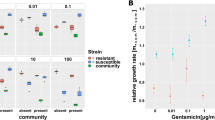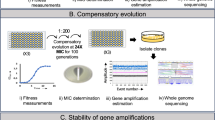Abstract
SOME understanding of the cellular responses which modify the effectiveness of growth-inhibitors can be gained by the study of closely related populations of microbial or mammalian cells differing in degree of sensitivity to a drug. Microbial cell lines resistant to antibiotics and antimetabolites can be developed readily by the selection of cells capable of surviving in the presence of increasing concentrations of such drugs1. Similar selection of drug-resistant neoplastic cells has been accomplished both in vivo 2 and in vitro 3. Occasionally the development of resistance to one drug is accompanied by changes which confer an increased sensitivity to a different agent, a finding applicable to both microbial4 and neoplastic cells2,5. The physiological mechanisms and metabolic systems associated with any increased effectiveness of drugs are of vital concern, but have received little attention because of the technical difficulty of directing the selection towards an increased, rather than decreased, responsiveness to a drug if that drug is used as the selecting agent. This communication concerns the reproducible selection in the absence of the drug of bacterial mutants of increased sensitivity to a folic acid antagonist (‘Aminopterin’).
This is a preview of subscription content, access via your institution
Access options
Subscribe to this journal
Receive 51 print issues and online access
$199.00 per year
only $3.90 per issue
Buy this article
- Purchase on Springer Link
- Instant access to full article PDF
Prices may be subject to local taxes which are calculated during checkout
Similar content being viewed by others
References
Schnitzer, R. J., and Grunberg, E., “Drug Resistance of Microorganisms”, 102 (Academic Press, New York, 1957).
Law, L. W., Cancer Res., 16, 698 (1956); Ann. N.Y. Acad. Sci., 71, 976 (1958).
Fisher, G. A., and Jaffe, J. J., Proc. Amer. Assoc. Cancer Res., 2, 296 (1958).
Syzbalski, W., and Bryson, V., J. Bact., 64, 489 (1952). Elion, G. B., Singer, S., and Hitchings, G. H., Ann. N.Y. Acad. Sci., 60, 200 (1954). Hutchison, D. J., ibid., 60, 212 (1954). Guthrie, R., Loebeck, M. E., and Hillman, M. J., Proc. Soc. Exp. Biol. and Med., 94, 792 (1957).
Law, L. W., Taormina, V., and Boyle, P. J., Ann. N.Y. Acad. Sci., 60, 244 (1954).
Bethell, F. H., Harris, R. S., and Stokstad, E. L. R., “The Vitamins”. edit. by Sebrell, W. H., and Harris, R. S., 3, 87 (Academic Press, New York, 1954). Nichol, C. A., “Symposium on Vitamin Metabolism”, 77 (National Vitamin Foundation Nutrition Symposium Series, No. 13, 1956).
Sauberlich, H. E., and Baumann, C. A., J. Biol. Chem., 181, 871 (1949).
Fisher, G. A., and Welch, A. D., Science, 126, 1018 (1957).
Author information
Authors and Affiliations
Rights and permissions
About this article
Cite this article
NICHOL, C. Selection of Bacterial Mutants of Increased Sensitivity to ‘Aminopterin’. Nature 183, 550–551 (1959). https://doi.org/10.1038/183550a0
Issue Date:
DOI: https://doi.org/10.1038/183550a0
Comments
By submitting a comment you agree to abide by our Terms and Community Guidelines. If you find something abusive or that does not comply with our terms or guidelines please flag it as inappropriate.



